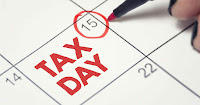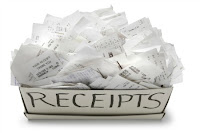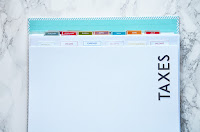You, as a published author or illustrator, are now a business. That means there is some not-so-fun things we have to deal with so we can keep writing and creating.
 Taxes.
Taxes.Let's face it. Laws change, the forms are about a million words long, and who knows what we may be missing if you don't have a certified accountant in the family.
I have a certified public accountant. I think they are worth the money, not only for the time it saves me, but the relief from stress and anxiety I have that I may mess something up and having the IRS show up Men In Black style.
+
Whether you are a do-it-yourself-er, or you use a pro, you need to be organized all year long. Not just those first two weeks of April.You don't need a fancy or expensive program. I use excel.
First: Do you have a home office that is solely used for your business as a writer or illustrator?
If so, this may be tax deductible. That means this little piece of creative heaven may save you a bit on your dues to Uncle Sam. But you have to keep track of some things:
- Your home's TOTAL square footage and the OFFICE square footage.
- Electric Bill
- Internet Bill
- Gas Bill
- Phone Bill
Then a percentage of you home's bills are what is actually deductible, based on how much space it takes. You have to have the totals for each month. It is easier to keep track of this monthly, rather than digging through old bills, or hunting for your gas company user name and password right before the tax deadline.

 You can also deduct business related expenses. Keep ALL receipts and label and organize them. If you get audited, you want everything available and easy to find. I'm talking file folders or binders as opposed to shoe boxes.
You can also deduct business related expenses. Keep ALL receipts and label and organize them. If you get audited, you want everything available and easy to find. I'm talking file folders or binders as opposed to shoe boxes.Items to track for possible deductions:
- Copies of your books for sales, promotional giveaways, and donations
- Mileage for School Visits
- Food and Hotels for out of town School Visits or Presentations
- Writer or Illustrator Organization Annual Dues (i.e. SCBWI)
- Classes for continuing your education
- Promotional materials (stickers, bookmarks, pins)
- Website fees
- Author/Illustrator Professional Photos (again, falls under promotional materials)
- Office Supplies
- Art Supplies (for illustrators)
- Necessary Office Equipment: Computer- yes! That mini golf putter thing and fancy espresso maker-no!
- Donations (if you donate a copy of your book, track what you pay, not the retail value.)
There is probably more that I haven't thought of, but hey, I'm new at this.
I keep everything in an excel spreadsheet in summary as well as a sheet for all I am paid:
- Advances
- School Visit Fees
- Speaking Engagements
- Royalties
Again, this is NOT a comprehensive guide. This is just stuff I've figured out on my own this year as a debut author. If you have any questions about your specific circumstances, I recommend finding a local tax pro. Preferably before next April.
So get organized and then get back to writing.


No comments:
Post a Comment